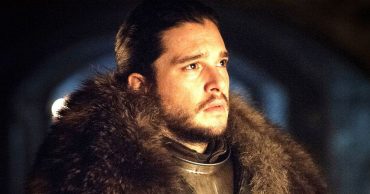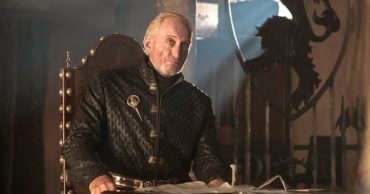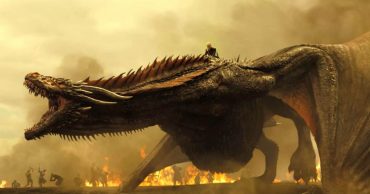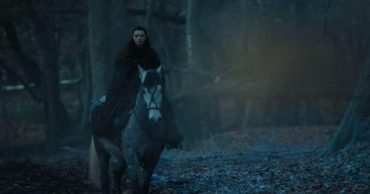
After the wildly inconsistent ride of season five, “Mother’s Mercy” left the world of Westeros in a new state of flux, with major leaders like Stannis Baratheon and Jon Snow and important political characters like the leaders of Meereen and Myrcella Lannister meeting their deaths in the season finale. It announced the end of an era for Game of Thrones – specifically, the end of the era covered by the books, adding new intrigue to the expansive, fantastical drama for its return nearly eleven months later with “The Red Woman”, an episode that surprisingly takes few steps forward to the future, opting to reflect on the many world-shaking events at the end of season five,in what turns out to be exceptionally satisfying fashion.
If there’s one knock against “The Red Woman”, it is its reluctance to move the narrative forward in a lot of places: this is a classic “check-in” episode of Game of Thrones, where the whirlwind between locations, characters, and scenes denies the show a lot of forward progress, mostly relegated to catching audiences up to speed while re-contextualizing the stakes for episodes to come. Myrcella’s death is a great example: in the wake of the death of another child, Jamie and Cersei promise revenge on the entire world for what they’ve done to the great Lannister family, stripping them of every single title, land, and self-effaced right they have, save for the throne they fought and schemed so viciously to take over. They have that, but everything else is gone: and understanding how Cersei and Jamie process their daughter’s death is paramount to setting the stage for their characters this season, even if its mostly spent in making declarations and delivering powerful, silent imagery, something “The Red Woman” uses to its advantage in nearly every single scene (see: the giant looming beyond Arya’s shoulder, Tyrion and Varys watching the ships of Meereen burn, et al.).
Arguably the biggest narrative turn comes in Dorne, where the Sand Snakes fully assume power after murdering the Prince of Dorne and his poor, artistic son Trystane. As I noted at the end of season five, the Sand Snakes existed in a bit of a vacuum last season, and their quest for power in Dorne still feels like small potatoes in the larger scheme of Game of Thrones. Are we to believe someone as short-sighted as Ellaria is going to ascend to power in any fashion? GoT has turned supposed ancillary players into major combatants for the throne in the past (like the Bolton clan), but there’s something hollow about Ellaria’s anger, blaming her brother for being passive while his family members get killed. It certainly makes sense, given her character and the world she lives in – but with the angry remnants of the Lannister family set to light her new kingdom on fire to find her and kill her, it doesn’t seem like Ellaria’s rash decisions are going to pay off well (also, her daughters seem no less horrible in this episode than they have in the past – Game of Thrones has had many conflicted, three-dimensional protagonists, which these women have not been to this point).
But ascend to power she does, as the Prince of Dorne bleeds and Davos and company stand over their own dead body, that of Jon Snow, dead at the treasonous hands of Ser Alliser. In the dark, dreary landscape of the Night’s Watch home base, Davos’ attempts to stall Alliser provided some of the most dramatic, tense moments of the hour: and surprisingly, not just because the fate of Jon Snow’s body (which let’s be honest, is the entire audience’s first priority this season) lies in the balance. As Melisandre sunkenly rests in her room (deploying the episode’s biggest visual shocker in the process – boy, she wasn’t kidding about being old and wise!), Davos and Jon’s trusted friends scramble to find a way to survive the wrath of Alliser and the arrows of all his men awaiting the last of Baratheon’s lieutenants, a one-handed seaman still trying to process the death of his own leader, much less the political minefield the Night’s Watch has become (even Alliser’s behavior draws a lot of ire from his colleagues; not all were in support of killing Jon, apparently): his calm demeanor is a thin guise for his anxiety, and “The Red Woman” draws a lot of tension from that singular sequence of Davos and Snow’s men with their swords drawn, protecting Snow’s stiff body while Ghost growls beside it.
However, the most tense sequence of the hour comes out of the season’s silliest cliffhanger: turns out the fall that killed Ramsay’s sex slave Myranda wasn’t far enough to kill everyone, because we cut immediately to Sansa and Reek running through the woods, trying to survive the harrowing winds and freezing waters to escape Ramsay’s men and hounds. They fail, of course (I mean, come on – it’s Reek leading the way here), but then Brienne of Tarth (a Kingslayer herself now) comes in, murders a bunch of people, and brings the most heartwarming moment Game of Thrones has offered in some time: Brienne pledging herself to Sansa’s protection, while Sansa stumbles through the official speech of accepting her guard. Arguably the most important scene of the premiere, Sansa’s acceptance of Brienne’s protection is arguably the beginning of Sansa’s political career: one that will need to be guided by the knowledge of others, as she finally opens her eyes to the world around her, albeit in a position free of Ramsay’s horrors where she’s able to finally take control of her own life, a woman in charge rather than a girl placed in the protection of others. In an episode full of sad, disheartening moments for many characters, Sansa’s fight to survive provides an emotional backbone even her sister’s scenes (in its briefness and intentional obscurity) can approach, a welcome shift in the show’s emotional priorities, and a much-needed shift in Sansa’s position in the Game of Thrones world.
Being a Game of Thrones premiere, there are plenty of other big introductory moments for the season – Jorah’s impending death, Dany being taken against her wishes (again), Tyrion figuring out what the hell to do with his life – but some of these moments feel glossed over in favor of returning to the core of the Stark children (save for the two young ones, who remain unseen since season four). However, with Game of Thrones headed into unfamiliar territory for the first time, it’s no surprise to see it lean on its most central, iconic characters to begin building momentum for the blood-soaked, tumultuous world season six will exist in, with an hour full of mourning, sadness, and allusion for what is to come.
Other thoughts/observations:
- welcome back to Game of Thrones reviews! since HBO is not sending out screeners in advance to any critics for season six, reviews may come a bit later than in previous seasons.
- “I saw him in the flames… fighting at Winterfell…” Melisandre’s confusion is so powerful in this hour.
- “Weak men will never rule Dorne again.” Keep killing everyone, Ellaria, and Dorne WILL CEASE TO EXIST.
- Ramin Djawadi’s score for this episode is phenomenal: the dissonant chords we hear as Cersei stares off into the distance are particularly harrowing.
- It’s so nice to have Varys/Tyrion discourse again… I could watch an entire series of them sitting and discussing the events of the series. Talk the Throne, anyone?
- The Dothraki debate over the
135 best things in the world gave some much needed comic relief to the dour proceedings of the hour. - Margaery is holding on to her position with the Faith, but boy, is she wavering. She’s a tough cookie, but Septor Unella is probably quite convincing.
 Follow Us
Follow Us





